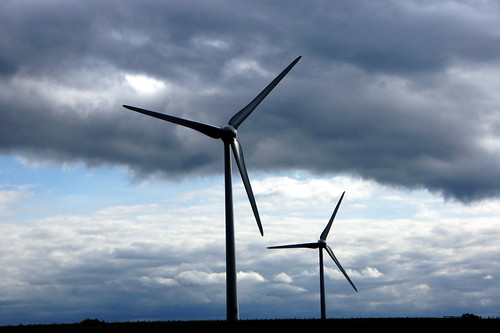
How Renewable Energy is Impacting our Earth
The use of 100% renewable energy is expanding in the United States. In the electric power sector, renewables are expected to grow 2.6 percent in 2015 and non-hydropower renewable power generation is expected to grow 6.9 percent. Moving away from traditional power sources to sustainable alternatives has a global impact that reaches far beyond American homes and businesses, creating beneficial changes around the world.
Reducing Global Warming Emissions

Image via Flickr by Wisconsin Department of Natural Resources
Global warming emissions have had a measurable impact on the earth’s health. According to the Union of Concerned Scientists, global warming is:
- Causing sea levels to rise and creating heavier rainstorms, which increase flood risks
- Creating longer and more dangerous wildfire seasons
- Leading to frequent heat waves that increase the risk for heat stroke, heat exhaustion, and other health problems
- Driving a longer and more intense allergy season
Electricity production is responsible for over a third of the global warming emissions produced in the United States. A quarter of these emissions come from coal-fired power plants. Renewable energy sources produce only a fraction of the carbon dioxide emissions of other energy sources. Coal emits as much as 3.6 pounds of carbon dioxide equivalent per kilowatt-hour (CO2E/kWh). In comparison, hydroelectric power emits up to 0.5 pounds of CO2E/kWh. Solar and geothermal power emit up to 0.2 pounds and wind emits up to 0.04 pounds.
Switching to renewable energy sources can have a monumental impact on CO2 emissions. Converting 25 percent of the nation’s energy production to renewable electricity would reduce CO2 emissions by 277 million metric tons a year. If 80 percent of America’s electricity came from renewable sources by 2050, global warming emissions associated with electricity production would drop as much as 81 percent.
Minimizing Dependence on Imported Fuels

Image via Flickr by pmarkham
Approximately a third of the oil used in the United States is imported, at an expense of $192 billion a year. Between 2004 and 2008, price manipulation and oil price shocks cost the country about $2 trillion. Reducing dependence on imported fuel can benefit both the individual consumer and the country as a whole.
Making environmentally friendly changes to your lifestyle is no longer a costly investment. In fact, the right adjustments will put money back in your pocket. When considering the pros and cons of solar energy upgrades, you’ll find the financial benefits well in your favor. Solar power is less expensive than traditional power and new systems are available for as little as $0 down. Find a solar installer in your area to determine what you need to prepare if you want to invest in a solar installation at home.
Fuel efficient cars offer similar benefits. Upgrading to a vehicle that gets 30 MPG over one with 20 MPG can save you $703 a year in fuel costs, adding up to over $3,500 over five years.
Creating New Jobs in Renewable Energy

Image via Flickr by twicepix
Increasing renewable energy use increases job opportunities. The 2014 National Solar Job Census revealed that jobs for solar workers grew 20 times faster than the overall economy. Over the past five years, solar energy employment has increased 86 percent. Renewable energy jobs in all sectors increased 18 percent from 2013 to 2014. Increasing renewable energy efforts around the globe also opens up new job opportunities in industries ranging from hydropower to advanced biofuels.
Facilitating Economic and Social Development

Image via Flickr by mckaysavage
Globally, one in five people lacks electricity for their home or business. Almost 40 percent of the population uses coal, charcoal, wood, or dung as cooking fuel, and 800,000 children die each year from exposure to indoor smoke. Fossil fuels are no longer a cheap or easily accessible source of energy. Renewable energy is quickly becoming a viable alternative for supplying power to developing countries.
In India, 25,000 households are powered by biomass-based mini-power plants running on discarded rice husks. Thirty-three million people in Asia and Africa will receive solar power through the company ToughStuff. Solar Sister has empowered over 1,000 women in Africa to become solar energy entrepreneurs, promoting clean cookstoves and renewable energy.
Whether you make the change to renewable energy sources in your own home or donate your time and resources to global organizations bringing renewable energy to developing countries, you can join a global movement toward a more sustainable future.
